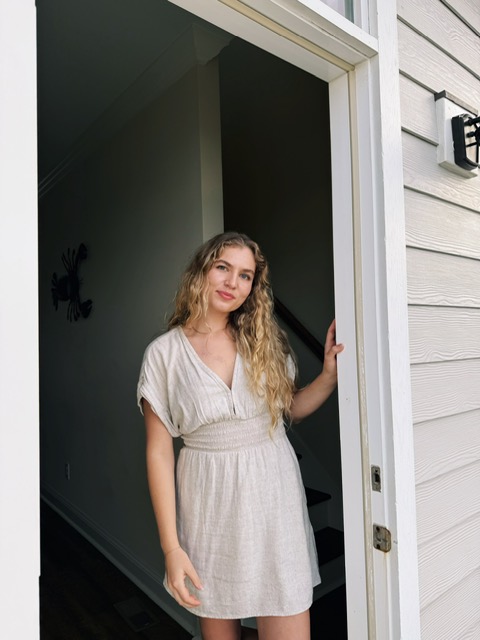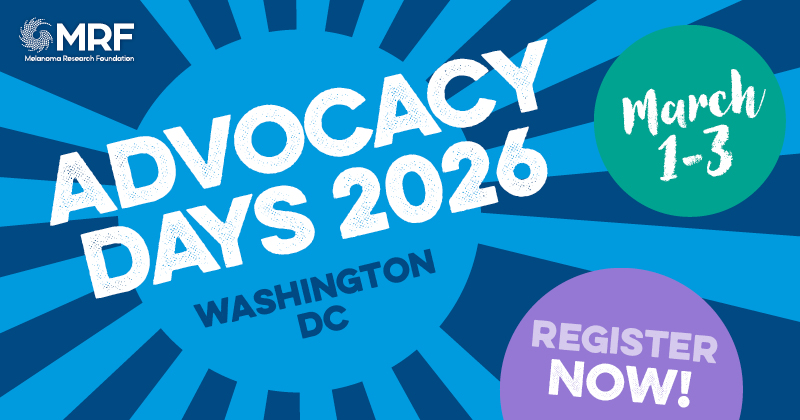Kora Kane’s Journey With Melanoma at 23

Guest blog post by Kora Kane, Melanoma Patient:
I was 23, just a year out of college. My biggest goals consisted of very early twenties ideas: to buy an apartment and stop renting, foster my relationships, figure out who I wanted to be, and get my first raise.
A lot of these goals came crashing down when I received a call from the dermatologist on a random Tuesday while walking home from the metro. “Spindle Cell Melanoma,” she said, “I’m so sorry.” But I thought….“I’ve heard of skin cancer before; can handle this.”
I didn’t quite realize that melanoma was different from the other skin cancers I had known of. Melanoma is aggressive, and it can quickly become life-threatening.
After a series of scans, doctors’ appointments, and a looming possibility of a skin graft on my chest, I had surgery consisting of a wide local excision around my melanoma and a sentinel lymph node biopsy. This left a four and a half inch scar below my collarbone. As my surgeon assured me that my lymph node looked normal, I believed my journey with melanoma had come to an end. If the worst outcome of my cancer experience was cosmetic — something as surface-level as a scar on my chest — I knew it was a privilege many others didn’t have the luxury to grieve. I will wear this scar with pride, I thought. And I meant it — and I do.
But unfortunately, that wasn’t the last of it. As my cancer diagnosis went from a stage 2 to a stage 3b, I felt my control slowly slipping from my fingertips. The biopsy results surprisingly confirmed that the melanoma had metastasized to my nearby lymph node. I felt panic rise in me as trust issues with myself and with my body emerged. Why had my body not done what it was supposed to do? I have never smoked or done drugs, I had not used a tanning bed, I ate intentionally, I moved my body often. I was 23. My body was supposed to take care of me.
I’ll spare you the rest of the details on my mental spiral, and the sinking feeling of dread as I googled “melanoma survival rates” and “how fast does melanoma spread”, because that’s simply not the point.
After weeks of gathering information from multiple oncologists, doing my first immunotherapy appointment, and scheduling more scans, I began to enter a stage of acceptance. This was the next few years of my life- I had no choice. I scheduled therapy sessions, stopped casually drinking, got lots of sleep, and focused on all the things in my control. These small things became huge things in my ability to cope. By choosing to take care of myself in all the ways that I could, I began to build a confidence that this would be temporary- that I had a say in my health and in my outcome.
Most would think the diagnosis was the hardest part — and for a while, they’d be right. But as acceptance of my diagnosis took root, a new obstacle emerged. I struggled to recognize this new version of myself that I was forced to become. My priorities had changed overnight. There were moments when I longed for the carefree version of myself — the one who was easygoing, spontaneous, and said yes to everything. But that version of me felt distant, unreachable, because of my new reality. Now I go to bed at 9pm. I don’t drink. I set boundaries. I pay for medical bills. I’m more emotional, reflective, and empathic. But here’s the thing — I like this version of me more.
This diagnosis forced me to live the 20-something period of life in fast-forward. It peeled back all of the layers of conditioning that the world had instilled in me, and it forced me to put myself and my healing first. It forced me to get real with how I wanted to live my life. I hope that if you are facing something similar, you choose yourself and your health too.
Something that was once so life-altering in the worst way became something that altered my life for the better. I know this isn’t a perspective I could’ve embraced right away — and if you’re new to this journey, you might roll your eyes and think it’s a bit too optimistic, even toxic. I get it, and I validate where you’re at. I also know that not everyone’s journey has the same outcome as mine. But I write this in the hope that, if you’re facing something similar, my story offers even a small sliver of peace. I share this because, one year later, this diagnosis does not control my life the way it initially felt it did.
I also want to acknowledge that access to timely care, specialists, and a strong support system played a crucial role in my outcome — and I understand that not everyone has that privilege. No one’s chance at survival should be dictated by resources, location, or luck. I’m grateful to the Melanoma Research Foundation for their vital work in expanding access, improving outcomes, and providing essential resources to those who need them most.
As of right now (May 2025), my scans are looking clear, and I’m on track to stop treatment in August. I wrote this story because it’s the story I needed to hear in May of 2023, when I was frantically Googling “What stage of melanoma do I have,” and desperately seeking hope on Reddit. I share it now to offer that hope, perspective, and to let anyone going through something similar know that they are seen. It’s a unique struggle to endure something so intense as you enter your 20s. And it’s often a lonely one. I want you to know that you are not alone. I empower you to take control, set boundaries, and connect. It may have saved my life.




